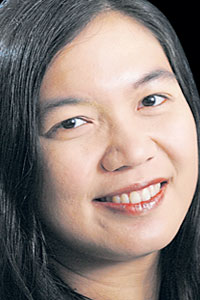Never before had I experienced and understood the difficulties faced by the blind until last week. My left eye became badly infected and had to be covered with a dressing for four days. Technically, I was temporarily half blind except when I sometimes felt so uncomfortable I tried to peek at things through the gap between the gauze and my cheek. To relieve some of the embarrassment about wearing a big gauze pad over my eye, I donned big sunglasses, even at night, during those four days.
Without any scientific knowledge of human vision, I started to notice differences between seeing with both eyes and seeing with only one. My observation was that I failed to see in three dimensions and that my field of vision and depth perception decreased. I could not see the ground or flights of stairs as clearly, so I occasionally missed my step. I could not see people and things moving out of the corner of my left eye and I misjudged distances.
During those four uncomfortable days, I unintentionally bumped into people walking past on my left side. During that time, I could not see them at all if they were walking close behind and trying to overtake me or if they were strolling from the opposite direction from a shorter distance than I could make out. When such things happened, those people looked either angry or surprised. I'd promptly apologise and explain that I could only see with one eye. I even had to wai the disgruntled ones. Once they heard the reason, they became sympathetic. I believe they forgave me because they thought I was really half blind. Whenever I went to a convenience store to buy something, I had problems looking for stuff on shelves beside me and below waist level. When I asked a shop assistant for help, she looked bothered at first but became helpful when I said I could see out of only one eye. I did not mean to lie about being blind and felt a bit guilty, as my short but easy explanation might be misleading.
As my eye infection and the ensuing hardship occurred during a cultural trip to the upper Northeast for work, I had no choice but to see a doctor, take medicine and keep working despite my limited vision. To ensure a smooth work flow, I had to adjust to new working methods _ taking pictures by looking at my camera's LCD screen instead of its viewfinder, recording all lectures and interviews instead of writing them down, and walking slowly and looking around carefully instead of rushing to destinations. However, I realised the poor eyesight caused a lot of difficulties. Using only one eye, I could not examine the fine details of the ancient sites and artefacts. I could not type on the computer without misspelling words and using incorrect punctuation. My right eye became weary early and I could not stay up until late at night or until dawn, which was not good for a night owl like me.
After all the bad things I experienced, I have much more admiration for those with visual impairment who live normal lives and earn a living despite Thailand's limited facilities for the disabled. Several blind people in Thailand have successful careers, such as law expert Prof Viriya Namsiripongphan, Senator Monthian Boontan and award-winning pianist Ubolwan Piakaew.
My experience last week reminded me of the TV show Jor Jai, screened several years ago, in which actress Siriyakorn Pukkavesa had a five-day experiment of living without vision. At the time I did not quite understand why and thought the programme just wanted more popularity and the actress wanted to try a new thing and raise funds for the blind. However, after watching the show on YouTube this week, I learned more about the livelihood of the blind in Thailand. For example, blind people who sell lottery tickets only make 3 baht profit from each ticket sold, while many of them have to put up with insults from some people who think they should do better jobs. One of them, nicknamed Nong Lukmee, had earned a bachelor's degree, could speak English well and had even read all the Braille Harry Potter books in English. However, she had been turned down for all the jobs she had applied for and ended up selling lottery tickets.
"Actually, I don't want to sell lottery tickets because this supports the government to lead people astray. But society forced me to do this job," she said. I was in awe of her observation.
My own experience with poor vision and awareness of the lack of opportunities for the blind prompted me to think about contributing more to society.
I have long heard of foundations seeking volunteers to read books, textbooks and printed materials for recordings for the National Library for the Blind and Print Disabled (www.nlbp.org). Near the end of last year, I heard about a campaign for the general public to donate old desk calendars to a foundation (www.blind.or.th) for making Braille educational materials for the blind. However, I had been too busy or too insensitive to help. Now, it is time for me to do more than merely writing and speaking about the rights of those with disabilities.
Pichaya Svasti is a travel writer for Life.
